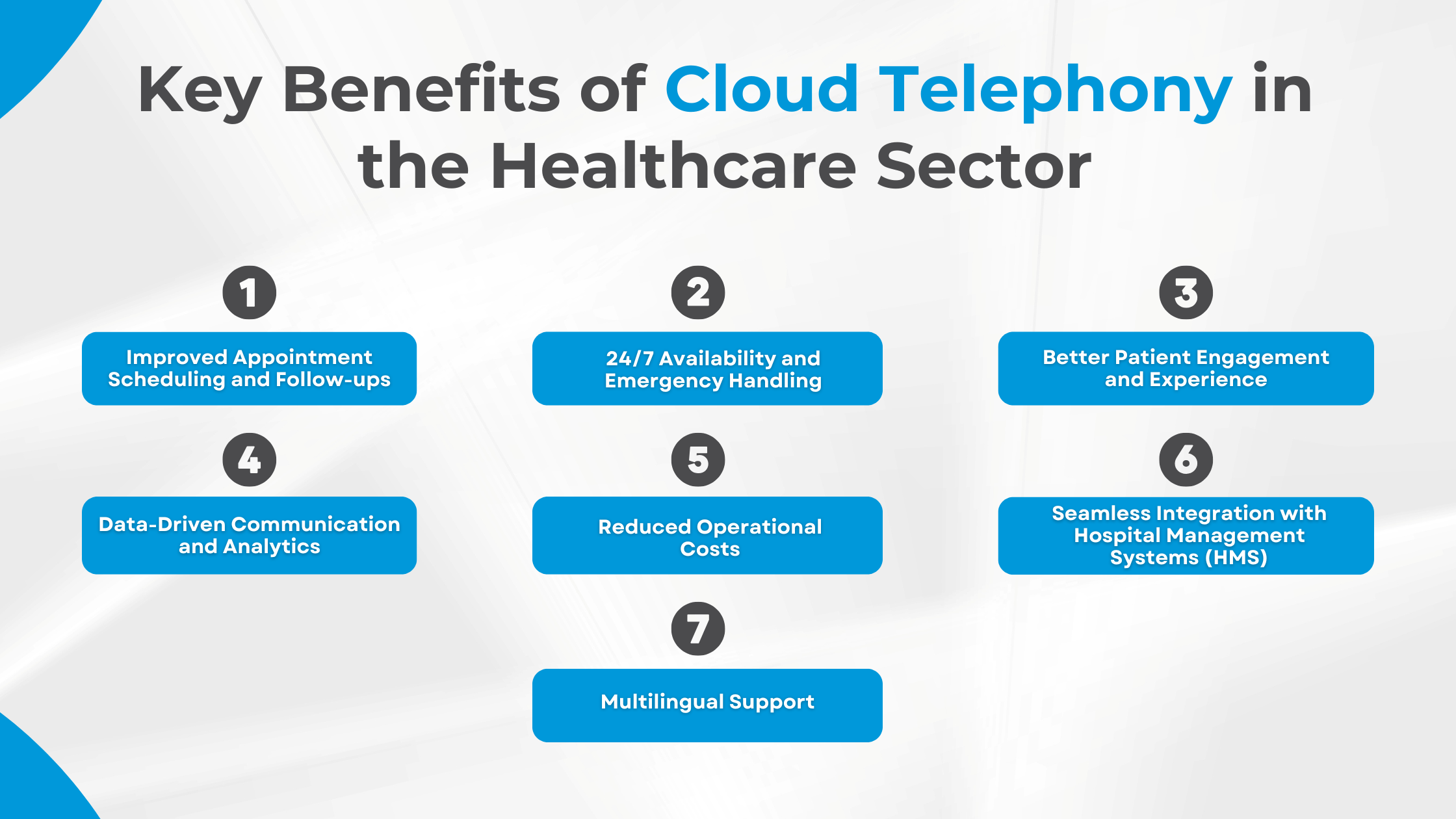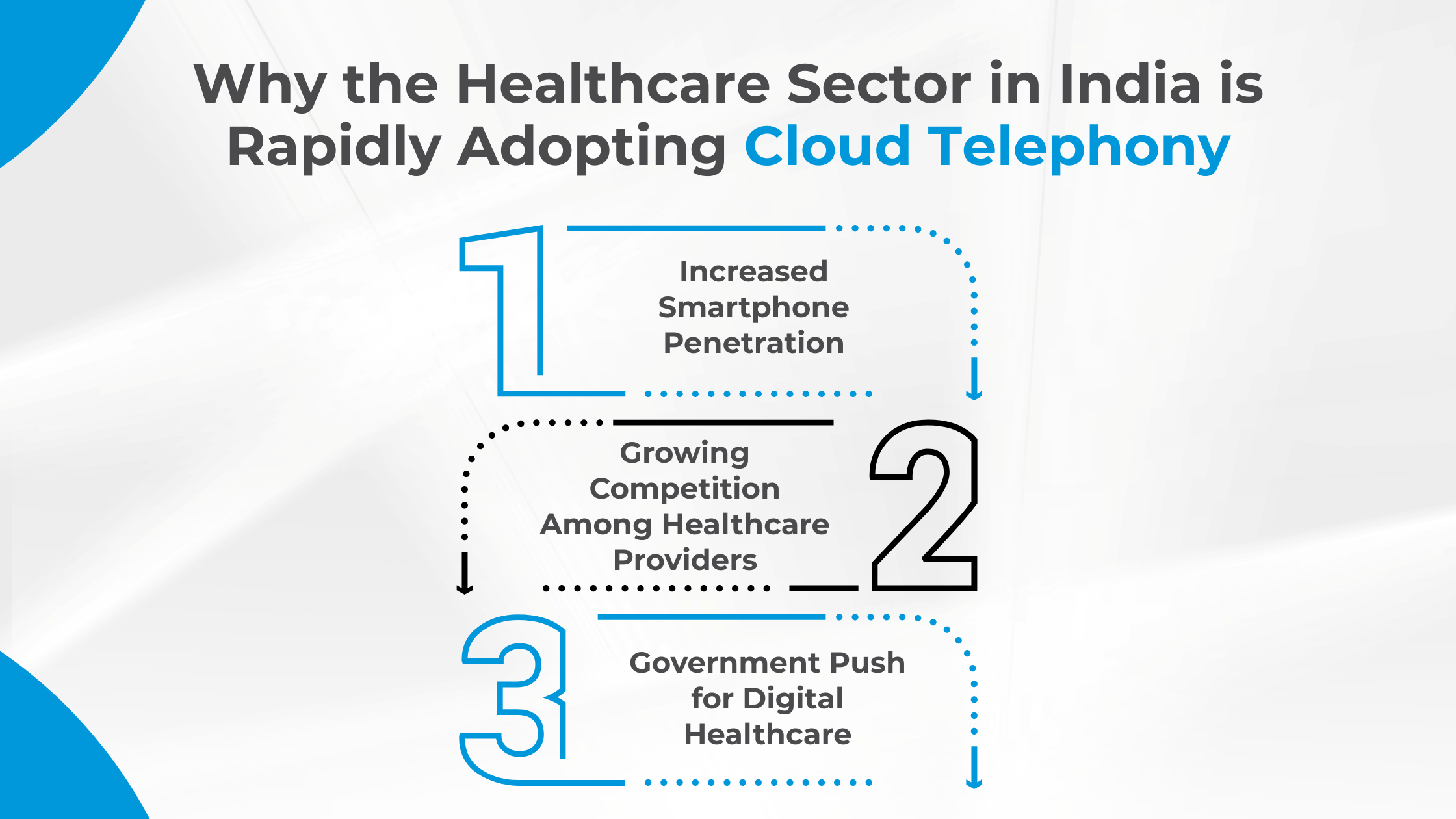Kommuno’s cloud telephony solutions are purpose-built to meet the communication challenges of modern healthcare providers. From automated appointment scheduling to seamless IVR-based call routing, Kommuno helps hospitals and clinics in India provide faster, more reliable, and patient-friendly communication. With customizable solutions and real-time analytics, Kommuno empowers healthcare institutions to reduce missed calls, ensure timely follow-ups, and improve patient engagement.
In today’s fast-paced digital era, communication plays a crucial role in every industry, especially healthcare. The way hospitals, clinics, and diagnostic centers communicate with patients has evolved significantly over the past few years. Traditional telephonic systems, while reliable to some extent, have become outdated due to their limited capabilities in handling high call volumes, lack of data integration, and inefficient patient follow-ups. This is where cloud telephony in India is making a remarkable difference.
The adoption of cloud telephony solutions in India has surged across sectors, and the healthcare industry is no exception. Whether it’s scheduling appointments, sending prescription reminders, or following up with patients for post-treatment care, cloud telephony has simplified and streamlined the process. Many hospitals are now partnering with the best cloud telephony providers in India to enhance patient satisfaction, improve operational efficiency, and reduce human errors.
This blog explores how cloud telephony is transforming patient communication in the healthcare sector and why it is becoming a necessity rather than a choice.
Cloud telephony is a modern communication system that routes calls, SMS, and other telephonic services through the internet instead of traditional phone lines. It allows healthcare facilities to manage high call volumes, integrate patient data, and automate communication processes, all without investing in heavy on-site infrastructure.
For the healthcare industry, where timely communication can sometimes mean the difference between life and death, this technology offers significant advantages. It ensures that patients can easily reach hospitals, get appointment confirmations, receive test results, or even consult doctors remotely without long waiting times or missed calls.
When implemented through the best cloud telephony providers in India, healthcare institutions gain access to advanced features such as call recording, IVR (Interactive Voice Response), automated SMS reminders, and analytics, helping them deliver better patient care and build stronger trust.

Missed appointments and delayed follow-ups are common issues in the healthcare sector. With cloud telephony, clinics can send automated appointment reminders via calls or SMS. Patients can also confirm, cancel, or reschedule appointments through interactive IVR systems.
For example, a patient scheduled for a diagnostic test can receive an automated voice call a day before, reminding them of the test timing and preparation guidelines. This reduces no-shows and improves resource utilization in hospitals.
One of the biggest challenges in healthcare is ensuring round-the-clock availability, especially during emergencies. Traditional phone lines are limited and often overloaded during peak hours.
With cloud telephony solutions in India, hospitals can set up 24/7 virtual helplines. Calls can be intelligently routed to available doctors, nurses, or emergency staff. Automated IVR systems at Kommuno can guide patients to the right department, ensuring that no emergency call goes unanswered.
Patient experience is a critical factor in healthcare. Long waiting times, unanswered calls, or poor follow-up can negatively impact a hospital’s reputation. Cloud telephony enables proactive communication.
Patients can receive post-surgery care instructions, prescription refill reminders, and follow-up call check-ins automatically. The personalized experience builds trust and shows patients that the hospital genuinely cares about their well-being.
Cloud telephony systems come with built-in analytics dashboards. Hospitals can track call volumes, patient inquiries, common complaints, and response times.
For instance, if analytics show that most calls are about appointment bookings, hospitals can add automated appointment booking features to their IVR system. By analyzing patient interaction patterns, healthcare providers can continuously improve their services.
Setting up and maintaining traditional telephone infrastructure can be expensive. Hospitals need separate phone lines, dedicated staff, and physical equipment.
Cloud telephony, on the other hand, requires minimal hardware. Most of the system is managed online by cloud telephony providers in India. Hospitals can scale up or down based on call volume, paying only for what they use, significantly reducing operational costs.
Modern cloud telephony solutions can integrate with Hospital Management Systems (HMS) or Electronic Medical Records (EMR). This integration ensures that when a patient calls, the doctor or receptionist can instantly view their medical history, appointment records, and treatment plans.
This saves time, improves accuracy, and ensures a more personalized approach to patient care.
India is a diverse country with multiple languages, and healthcare communication must cater to this diversity. Cloud telephony solutions allow hospitals to set up IVR menus in regional languages, ensuring patients feel comfortable and understood.
Cloud telephony in India has transformed the way healthcare institutions communicate with patients, caregivers, and internal staff. Its flexibility, automation, and scalability make it ideal for managing high patient volumes and ensuring timely communication. Here are some key use cases that highlight its impact:
Hospitals and clinics can use cloud telephony to automate appointment confirmations and reminders through voice calls or SMS. Patients can confirm, cancel, or reschedule appointments via Interactive Voice Response (IVR), reducing manual follow-ups and minimizing no-shows.
In emergencies, every second counts. Cloud telephony enables hospitals to set up 24/7 helplines where calls are intelligently routed to available doctors or emergency teams. Priority routing ensures critical cases are addressed immediately, reducing delays in care delivery.
Healthcare providers such as Kommuno can automate follow-up calls to check patient recovery, share post-surgery care instructions, or remind them about scheduled physiotherapy or diagnostic tests. This improves patient engagement and builds trust.
Pharmacies and diagnostic labs can send automated notifications when reports are ready or when it’s time for a medicine refill. Hospitals also use this to run mass vaccination reminders or health camp awareness campaigns.
Doctors can consult patients via cloud-based calling without sharing personal phone numbers, ensuring privacy while maintaining accessibility for patients.
Automated IVR surveys help hospitals collect feedback after discharge, enabling continuous improvement in patient care and service quality.

The Indian healthcare sector faces unique challenges such as high patient volumes, limited staff, and linguistic diversity. The increasing demand for quick and accurate communication is pushing hospitals and clinics to modernize their systems.
The rise of cloud telephony in India is also fueled by:
Many leading hospitals are already partnering with the best cloud telephony providers in India to handle thousands of daily patient interactions without compromising quality.
With numerous providers available, selecting the right solution can be challenging. Here are some factors healthcare institutions should consider:
Patient confidentiality is crucial. Choose providers that ensure end-to-end encryption and comply with healthcare data protection guidelines.
Hospitals must pick a provider capable of handling peak call volumes, especially during health emergencies or pandemic-like situations.
Look for solutions that can easily integrate with existing HMS or CRM systems to provide a unified patient view.
Given India’s linguistic diversity, hospitals should select providers offering regional language support.
Since healthcare communication is critical, reliable technical support from the provider is essential.
Some of the best cloud telephony providers in India, such as Kommuno, already cater specifically to the healthcare sector, offering tailored solutions to meet these requirements.
The future of cloud telephony in healthcare looks promising, with several innovations on the horizon:
As more hospitals adopt these technologies, the Indian healthcare sector will witness improved efficiency, better patient outcomes, and higher satisfaction levels.
Cloud telephony is no longer just an optional upgrade; it has become an essential part of modern healthcare communication. From appointment reminders to emergency helplines, the technology ensures smooth, reliable, and patient-friendly interactions.
The growing demand for cloud telephony in India and the increasing number of cloud telephony solutions in India specifically tailored for healthcare highlight its transformative potential. By choosing the best cloud telephony providers in India, hospitals and clinics can ensure seamless communication, enhance patient care, and build a stronger reputation in the competitive healthcare landscape.
As the industry continues to embrace digital transformation, cloud telephony at Kommuno will remain at the heart of patient communication, making healthcare more accessible, efficient, and patient-centric than ever before.
Elevate Your Business Game with Kommuno – The best way to stay connected to customers!
Copyright ©2024 All Rights Reserved | Kommuno Technologies Pvt Ltd
Copyright ©2024 All Rights Reserved | Kommuno Technologies Pvt Ltd